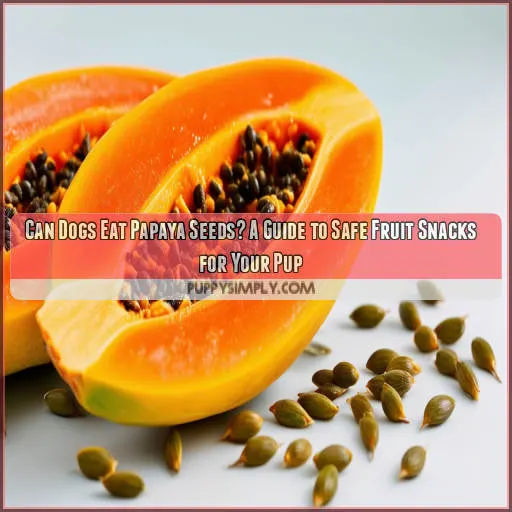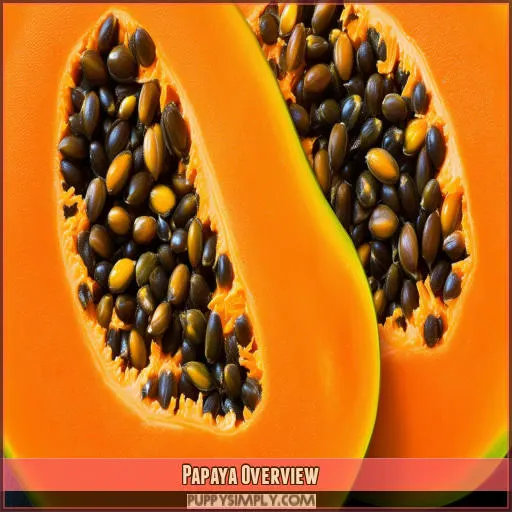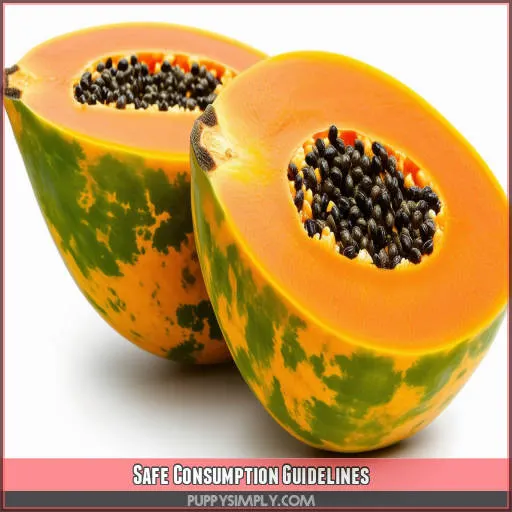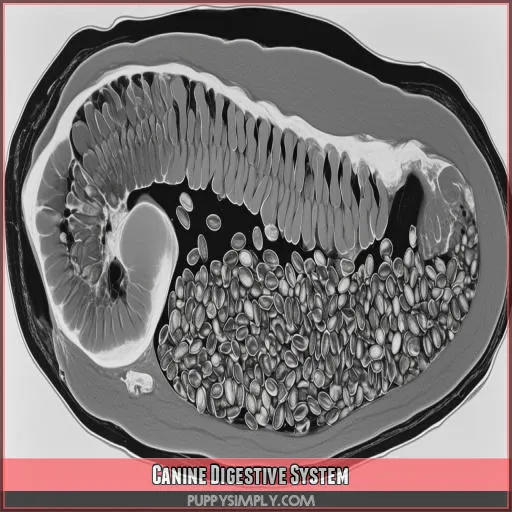This site is supported by our readers. We may earn a commission, at no cost to you, if you purchase through links.

While the flesh is safe and nutritious, the seeds contain trace amounts of cyanide that could potentially lead to toxicity or intestinal blockage if consumed in large quantities.
It’s best to remove the seeds before offering papaya to your furry friend.
However, if you do decide to let them have a few seeds, monitor their reaction closely and consult your vet if you notice any adverse effects.
Want to make sure your pup enjoys their fruity snack without any worries?
Keep reading for a complete guide on safely incorporating papaya into their diet.
Table Of Contents
Key Takeaways
- Hold your horses before tossing those papaya seeds to Fido! While the fruit’s a nutritional jackpot, the seeds are like tiny time bombs—packing trace amounts of cyanide that could spell trouble if your pup goes overboard. Remember, good things come in small packages, but in this case, it’s more like "small packages, big problems."
- Ever heard the saying, "One man’s trash is another man’s treasure"? Well, flip that for papaya seeds. Your pup might see them as tasty treats, but they’re more like ticking time bombs for their tummy. These little guys can cause intestinal blockages faster than you can say "vet bill," so it’s best to keep them out of your furry friend’s bowl.
- Picture this: You’re at an all-you-can-eat buffet, but one dish is sprinkled with a dash of something toxic. Would you risk it? That’s your dog with papaya seeds. Sure, they might handle a few without turning into a furry Sleeping Beauty, but why play Russian roulette? Stick to the sweet, vitamin-packed flesh—it’s like a health potion without the side quest.
- Remember when your mom said, "If your friends jumped off a bridge, would you?" Apply that wisdom here. Just because some bold pooches munch on papaya seeds doesn’t mean your buddy should follow suit. Be the responsible pet parent—opt for safer fruity adventures like cantaloupe or boysenberries. Your dog’s digestive system will thank you, and you’ll avoid a potential "ruff" situation!
Can Dogs Eat Papaya Seeds?
No, dogs shouldn’t eat papaya seeds. Papaya seeds contain small amounts of cyanide, which can be toxic to dogs if consumed in large quantities.
Papaya Overview
Papayas are packed with vitamins A, C, and fiber, making them a nutritious snack option. However, their seeds contain trace amounts of cyanide, a toxic compound that can potentially harm your dog if consumed in large quantities.
Nutritional Profile
You’re right to recognize papaya’s benefits for your pup. Its flesh is packed with vitamins A, C, and fiber, promoting healthy eyes, skin, and digestion. But remember, the seeds contain trace cyanide levels, so moderation is key. Opt for small, seedless portions or explore tasty alternatives like mango or cantaloupe.
Cyanide Content
While papayas offer nutritional benefits, their seeds contain trace amounts of cyanide. Ingesting large quantities can lead to cyanide toxicity in dogs, potentially causing Intestinal Blockage or poisoning. As a responsible pet owner, it’s essential to monitor your pup’s papaya intake and consult a veterinarian if you suspect cyanide ingestion or intestinal issues.
Seeds and Toxicity
Papaya seeds contain trace amounts of cyanide, a toxic compound that can be harmful if consumed in excessive quantities. While the papaya flesh itself poses little risk, it’s important to exercise caution when feeding papaya seeds to dogs due to their potential toxicity and the risk of intestinal blockage.
Cyanide Levels
While the pulp of papayas is safe for your pup, the seeds contain trace amounts of cyanide that can be toxic in large quantities. To safeguard your dog’s well-being, it’s imperative to comprehend:
- Cyanide levels vary in papaya seeds
- Cooking doesn’t eliminate all cyanide compounds
- Smaller dogs are at higher risk of toxicity
- Monitor for signs of cyanide poisoning (vomiting, difficulty breathing)
- Consult your vet before introducing new foods
Potential Risks
While papaya seeds contain small amounts of cyanide, consuming too many can lead to digestive issues or even toxicity in dogs. The risk of intestinal blockage also exists due to their size and dogs’ difficulty breaking them down. Practicing safe consumption by limiting seed intake and monitoring for adverse reactions is essential for your pup’s well-being.
Safe Consumption Guidelines
You can safely feed your dog the papaya flesh, as it’s non-toxic and packed with beneficial nutrients. However, the seeds should be consumed in moderation due to their potential to cause intestinal blockage if ingested in large quantities.
Papaya Flesh
You can safely feed your pup papaya flesh as a healthy treat! The brightly colored flesh packs essential nutrients like vitamins A and C, fiber, and antioxidants. Plus, papayas’ soft texture and sweet taste make them an enticing snack dogs tend to love. Just remember to remove the seeds first – the flesh itself is wholly digestible.
Seed Quantities
While papaya flesh is safe, you’ll want to be cautious with the seeds. Moderation is key:
- Limit servings to a few seeds at a time
- Monitor for digestive issues like vomiting or diarrhea
- Avoid large seed quantities to prevent intestinal blockages
If concerned, opt for safer fruits like bananas or seedless watermelon. Your pup’s wellbeing should always come first when introducing new snacks.
Canine Digestive System
When considering whether papaya seeds are safe for your dog, it’s important to understand their digestive system’s capabilities. Dogs produce enzymes that can break down small amounts of cyanide compounds found in papaya seeds, but larger quantities may pose a risk of intestinal blockage or toxicity.
Enzyme Production
You know how important your pup’s gut health is for overall wellbeing. Dogs produce digestive enzymes that help break down food, but their ability to metabolize cyanide compounds found in papaya seeds is limited. This could lead to gastrointestinal distress. To illustrate the enzyme activity involved, consider this table:
| Enzyme | Source | Function |
|---|---|---|
| Amylase | Pancreas | Breaks down starch |
| Protease | Stomach | Breaks down proteins |
| Lipase | Pancreas | Breaks down fats |
While dogs can digest papaya flesh, the seeds pose risks that responsible pet parents should avoid.
Intestinal Blockage
The seeds’ fibrous nature makes them a choking hazard if eaten whole. Even if swallowed, papaya seeds can cause:
- Intestinal blockages
- Gastrointestinal distress
- Potential cyanide poisoning
For your pup’s safety, it’s best to avoid feeding papaya seeds altogether. Stick to the flesh, which provides valuable nutrients without the risks.
Alternative Fruit Options
While papaya seeds should be avoided due to potential toxicity, there are many fruits with low-risk or edible seeds that make excellent snacks for your pup. Consider options like cantaloupes, which are packed with nutrients and have edible seeds, or boysenberries, whose antioxidant-rich seeds can be eaten in moderation.
Low-Risk Seeds
You can offer your pup low-risk seeds like boysenberries in moderation. Their rich antioxidants benefit overall health, but monitor seed quantity to prevent digestive discomfort. Consider safe consumption levels based on your dog’s size and digestive tolerance. Explore alternative fruit options with non-toxic seeds as potential risks exist with certain seeds.
Edible Seeds
If you’re looking for edible seeds to share with your pup, melons like cantaloupes and honeydews are excellent options. Their seeds are packed with nutrients like vitamins A and C, plus fiber for digestive health. You can roast the seeds for a crunchy treat or feed them raw. Just be mindful of portion sizes to avoid any tummy troubles.
Frequently Asked Questions (FAQs)
Can papaya seeds cause diarrhea in dogs?
Yes, feeding your dog papaya seeds can lead to diarrhea. They contain compounds that irritate the digestive system, causing stomach upset. It’s best to stick with the fruit’s flesh, which is safe and nutritious for your furry friend.
Are papaya seeds a choking hazard?
Like David facing Goliath, your pup’s throat is no match for papaya seeds. They’re hard, bulky, and slippery—a triple threat that can easily block airways. Don’t risk it; these seeds aren’t worth the potential emergency vet visit.
How many papaya seeds are toxic?
You’d be surprised—even a few papaya seeds can be toxic. Their cyanide content and potential to block intestines make them a no-go. It’s best to steer clear entirely, as there’s no safe number to consume.
Do papaya seeds interact with medications?
FYI: Papaya seeds can interact with blood-thinning meds like warfarin, potentially increasing your risk of bleeding. They may also affect blood sugar control drugs. Always chat with your doc before munching on these peppy seeds—safety first!
Can papaya seeds cause vomiting in dogs?
Yes, papaya seeds can cause vomiting in your furry friend. They contain trace amounts of cyanide and may lead to intestinal blockage. It’s best to stick to the fruit’s flesh, which is packed with vitamins A and C.
Conclusion
Like traversing a treacherous path, feeding your dog papaya seeds demands utmost care.
While the fruit’s flesh provides nourishment, its seeds harbor minuscule amounts of cyanide that can prove harmful in abundance. They could also induce intestinal obstruction.
If you ponder, "Can dogs consume papaya seeds?" the response is affirmative, albeit in negligible quantities. It’s more prudent to discard them entirely.
Keep a watchful eye on your pet if they ingest any seeds, and seek veterinary assistance promptly should you observe unfavorable reactions.











